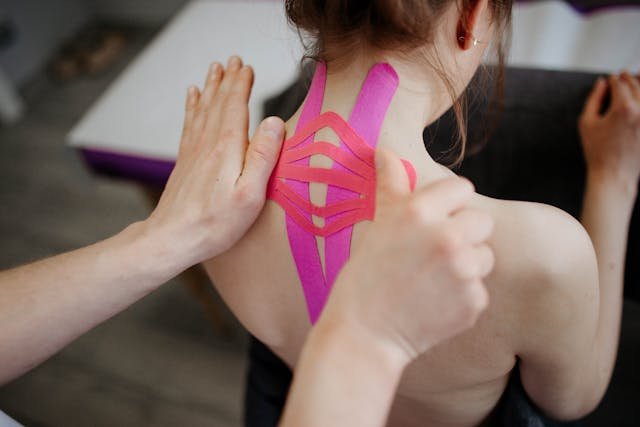UPPER BODY
Pinched Nerve in Neck

Medically called nerve compression or a pinched nerve in neck occurs when there is a pressure felt in the nerves. This usually happens when forces cause the nerve to become trapped and pressed between tissues such as bones, cartilage, tendons, and ligaments. The pain of pinched nerve can be severe and may be a reason for cervical radiculopathy. Cervical radiculopathy is a condition in which the pain passes through the arms, hands, feet, and legs. Studies suggest that a chiropractor can improve patients’ outcome of cervical radiculopathy through chiropractic. It is important to keep in mind that the sooner a patient receives the healing, the more likely to avoid lasting nerve damage, swelling, and fluid build-up.
What Causes Pinched Nerve in Neck
- Unexpected trauma or accident
- Herniated disc
- Repetitive movement
- Sitting or standing and putting yourself in one position for a long period of time.
- Bone spurs
- Increased weight and water retention due to pregnancy
- Scalp tenderness
Symptoms of a Pinched Nerve
- Muscle contraction
- Burning pain through the lower back or neck.
- Severe pain in the leg or foot if the pinched nerve is in the lower back.
- Severe pain in the arm and shoulder if the pinched nerve is in the neck.
- Weakness or lack of sensation in the arms or legs that are due to the pinched nerves in certain muscles.
- Pins-and-needles sensations.
- Burning sensations.
Areas Where Pinched Nerve Occurs
The Sciatic Nerve – it can cause pain in the lower back and in the leg.
The Cervical Spine – it is also known as neck region of the back. Pinched nerve in this area can cause severe pain that will go down to shoulder blade and arm.
The peroneal nerve that is located in the lower leg. It controls certain muscles in the toes and foot.

Pinched Nerve & Chiropractic
The body’s nervous system is interconnected from head to toe. If an issue occurs in the neck, pain may radiate to the arm or thigh.
A pinched nerve occurs when a nerve is compressed or misaligned, often due to poor posture, heavy lifting, or reaching. Weakness or difficulty moving should be evaluated by a healthcare professional.
Chiropractors are qualified to treat pinched nerves by assessing the spine for misalignments, or subluxations. When vertebrae are out of place, they can pressure nerves and cause pain. Chiropractors use spinal manipulation to realign the spine, relieving pressure on the nerves. This improves blood flow, oxygen, and nutrient supply, which supports the circulatory and immune systems, reducing pain.
To make an appointment with a top-rated chiropractor in Charlotte, NC, contact Beyond Wellness Chiropractic Center, P.C. today. We have a “no wait” policy to ensure you receive quality care without delays.
